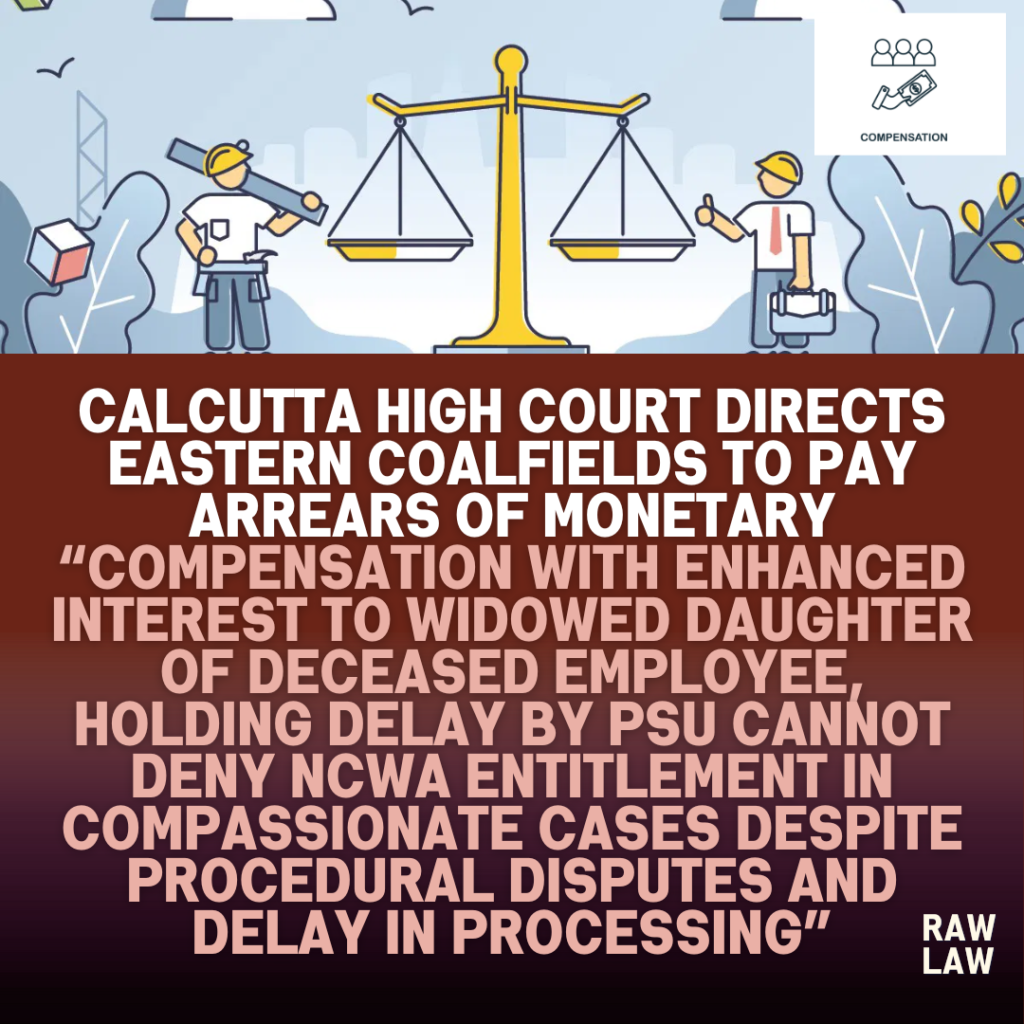Court’s Decision
The Calcutta High Court dismissed the appeal by Eastern Coalfields and partly allowed the claimant’s appeal, modifying the single judge’s order to direct payment of arrears of MMCC from 27 August 2001 (when the screening committee confirmed the claim’s authenticity) instead of the date of death, with enhanced simple interest at 7.5% per annum, to be paid by 15 July 2025.
Facts
The deceased employee’s widow, Tulsi Bouri, had been employed under compassionate grounds with Eastern Coalfields. After her death in 2000, her widowed daughter sought employment under the National Coal Wage Agreement (NCWA) provisions, declining monetary compensation initially. A screening committee in 2001 found her claim genuine but raised queries regarding age and other legal heirs. The claimant repeatedly furnished documents, but Eastern Coalfields did not decide on her application, keeping it pending for over a decade. In 2024, considering her advanced age, she requested MMCC instead of employment and filed a writ petition seeking arrears from the date of her mother’s death.
Issues
- Whether the widowed daughter was entitled to MMCC despite initially seeking employment under NCWA.
- Whether Eastern Coalfields’ inaction and delay justified payment of arrears from the date of death.
- Whether the interest awarded should be enhanced due to prolonged delay caused by the PSU’s apathy.
Petitioner’s Arguments
The claimant argued that she was entitled to MMCC under Clause 9.5.0 of NCWA, which gives female dependents the option of either employment or monetary compensation, not the employer. She contended that despite providing necessary documents, Eastern Coalfields failed to decide her application, forcing her to approach the court. She sought arrears from the date of death with 18% interest due to prolonged harassment and delay.
Respondent’s Arguments
Eastern Coalfields contended that the claimant failed to submit proper documentation to prove sole dependency, justifying the delay. They argued that the claimant initially refused MMCC and later changed her demand, and that granting arrears from 2000 would create a heavy financial burden on a public sector undertaking. They cited precedents arguing that arrears should be limited to three years prior to the filing of the writ petition due to delay on the claimant’s part.
Analysis of the Law
The court analysed Chapter IX of the NCWA, particularly Clauses 9.3.0, 9.3.2, and 9.5.0, establishing that the option to choose between employment and MMCC lies with the dependent, not the employer, and delay or financial solvency is not a bar under the NCWA. The court noted that NCWA is a settlement under the Industrial Disputes Act, binding on both parties, and delay cannot be used to deny a legitimate claim unless it alters the opposing party’s position irreversibly.
Precedent Analysis
The judgment relied on:
- Subhadra v. Ministry of Coal (2018) 11 SCC 201: NCWA benefits are binding, and delay should not defeat rights under NCWA.
- Mohan Mahato v. Central Coalfields (2007) 8 SCC 549: Settlement under NCWA has binding force, and PSUs must act fairly and reasonably.
- Central Coalfields v. Bipini Murmu (2024 SCC OnLine SC 1535): Female dependents crossing 45 years are entitled to MMCC, and claims should not be denied due to age bar if the delay is not the claimant’s fault.
- S.K. Mastan Bee v. GM, South Central Railway (2003) 1 SCC 184: Illiteracy and lack of knowledge should not deprive claimants of rightful benefits under Article 21.
These cases underscored that MMCC under NCWA is not discretionary but a vested right, and PSUs must process claims diligently.
Court’s Reasoning
The court found that the claimant’s consistent efforts to secure employment or MMCC were thwarted by Eastern Coalfields’ apathetic and arbitrary delays. The claimant furnished documents, attended hearings, and provided witnesses, but Eastern Coalfields failed to resolve procedural queries and kept the application pending for over a decade. The court noted that while the claimant initially refused MMCC, it was her right under the NCWA to demand employment, and upon surpassing the age limit, to seek MMCC without forfeiting her entitlement. Given the committee’s acknowledgment of her claim’s genuineness on 27 August 2001, the court deemed it appropriate to award arrears from that date.
Conclusion
The appeal by Eastern Coalfields was dismissed, and the claimant’s appeal was partly allowed, modifying the single judge’s order to direct payment of arrears of MMCC from 27 August 2001 with simple interest at 7.5% per annum, to be paid by 15 July 2025. The court reinforced that MMCC under NCWA is a vested right, and PSUs cannot avoid liability by procedural delays.
Implications
This judgment reinforces:
- MMCC and compassionate employment under NCWA are enforceable rights, not discretionary grants by PSUs.
- Procedural delays and lack of diligence by PSUs will not defeat the rights of dependents under NCWA.
- Courts will impose interest on delayed payments to ensure accountability and deter institutional apathy.
Short notes on cases referred and relevance
- Subhadra v. Ministry of Coal: MMCC delay violates employee rights; delay by employer cannot defeat claim.
- Mohan Mahato v. Central Coalfields: Settlement under NCWA is binding, and PSU actions must be fair.
- Central Coalfields v. Bipini Murmu: Female dependents over 45 entitled to MMCC.
- S.K. Mastan Bee: Illiteracy should not deny benefits under Article 21.
These cases strengthened the court’s reasoning to direct MMCC payment with interest despite delays.
FAQs
1. Can a widowed daughter claim MMCC under NCWA if she initially sought employment?
Yes, under NCWA, female dependents have the right to opt for MMCC or employment, and opting for MMCC later does not forfeit the right.
2. Does delay by the employer bar the claim for MMCC under NCWA?
No, delays by the employer in processing claims do not bar entitlement to MMCC under NCWA, and courts may impose interest on arrears.
3. From when can arrears of MMCC be claimed under NCWA?
Arrears can be claimed from the date when the employer acknowledges the claim’s authenticity, even if it is years after the death of the employee.



